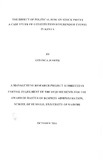| dc.description.abstract | The value of a firm is equal to the present value of its expected cash flows, discounted by investors' required rate of return. Both present values of expected cash flows and required rates of return could be affected by a number of factors among them the outcome of the Constitution Referendum vote either positively or negatively. Indeed, the outcome of the referendum votes could lead to changes in the cash flows of Kenyan firms through the uncertainty associated with it.
This paper studies the impact of political risk on stock prices at NSE by examining the two constitution referendum events in Kenya. The uncertainty surrounding the outcomes of the votes presented some form of political uncertainty. This study uses the theory of Efficient Market Hypothesis to forge a link between political risk and stock performance in the Nairobi Stock exchange.
This study analyses the performance of Nairobi stock exchange during the two constitution referendum events. Kenya has had two constitution referendum events .one on 21s' November 2005 and the other one on 4(h August 2010.The 2005 vote was defeated while the second one was successful hence giving Kenyans a new constitution. The objective of the study was to confirm whether these events had any effect on the stock prices of listed companies. This was done by obtaining daily stock prices data for the period of the study and then obtaining benchmark normal return and Cumulative Average Abnormal Returns.
The study results as indicated by the Cumulative Average Abnormal Returns confirm that the stock prices were affected by both the events. However the greatest effect was felt in the 2005 constitution referendum vote where high number of companies experienced negative cumulative Average Abnormal returns as compared to the 2010 event. This may be explained by the fact that the passing of a new constitution was expected to pave the way for fundamental reforms in governance and also bring about increased operational efficiency of a devolved Government including, a dispersion of increased business opportunities, which will considerably and favorably induce Kenya's economic multiplier.
The preliminary results of this study are inconsistent with the Efficient Market Hypothesis which asserts that financial markets are “informational efficient", or that prices on traded assets (e.g stocks, bonds or property) contends the view that current stock prices fully reflect available information about the value of the firm, and there is no way to earn excess profits, (more than the market overall), by using this information. | en_US |

